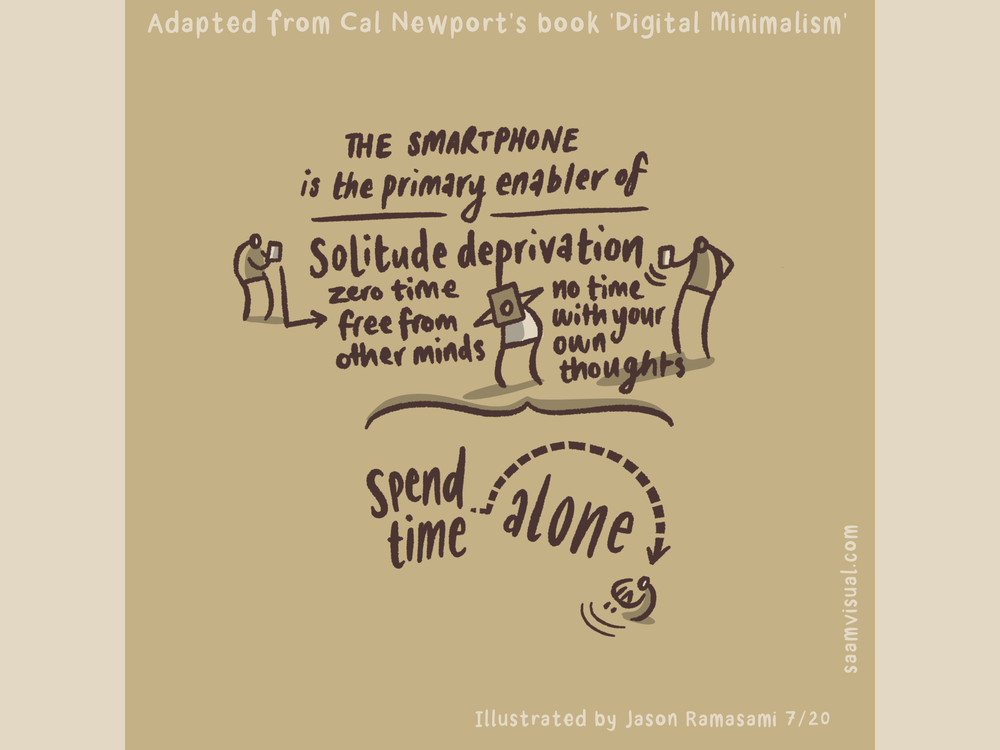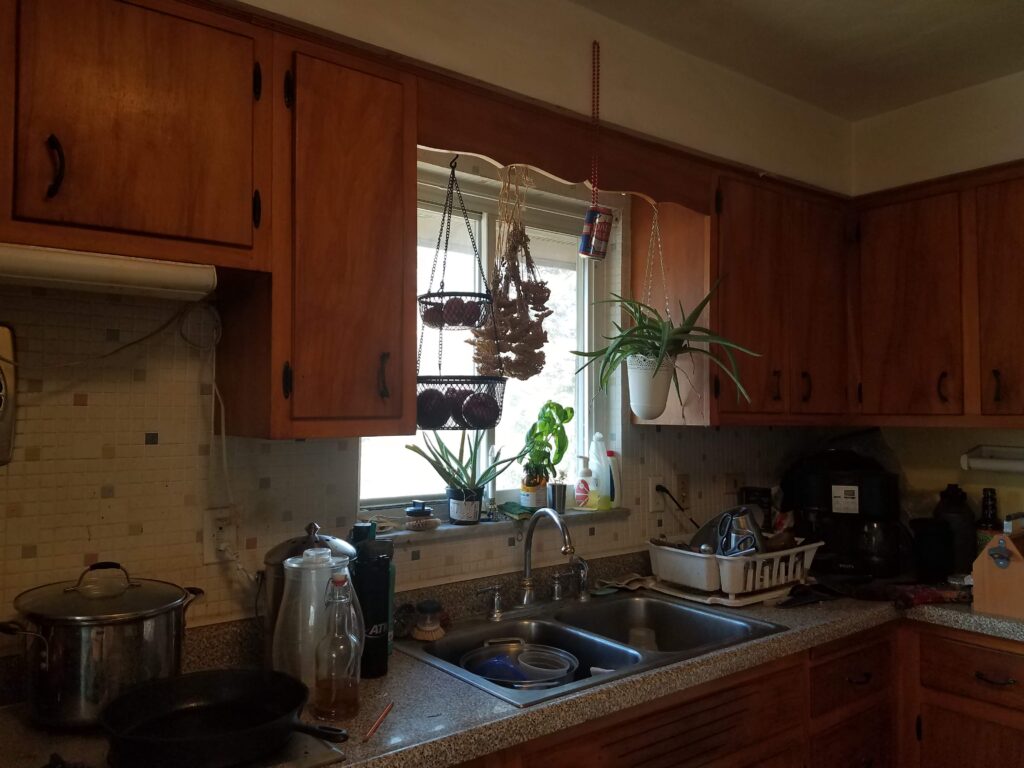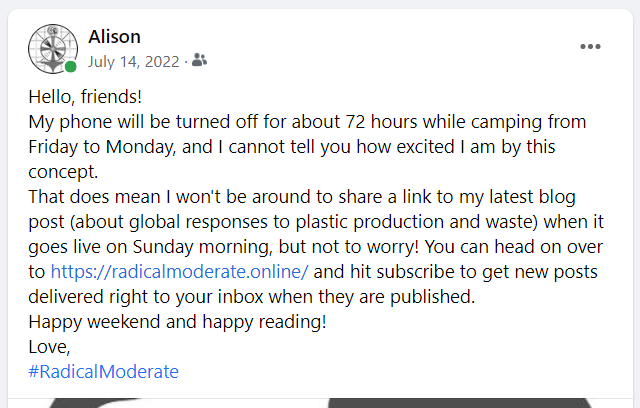Spend Time Alone
After removing apps from your phone and unnecessary websites from your routine, you will likely have a lot more time on your hands. Americans tend to spend more than three hours every day looking at their phones,[1] and according to Cal Newport in his book Digital Minimalism, once you include time listening to music, audiobooks, or podcasts, some members of younger generations spend as much as nine hours interacting with their phones every day.[2]
Newport’s guidelines for a digital declutter include several practices to fill that regained time in a way that will be more healthy and rewarding than what they’re replacing. And now that I’m wrapping up the first full week of my Lenten detox, I will talk about the first of those four: “spend time alone.” Contrary to what it may sound like, that does not necessarily mean you need to achieve physical isolation – the idea is to get mental quiet time, which can be done in public (case in point: I am writing this post while sitting 10 feet from Christian, who is on his own laptop). Conversely, it is still possible to be mentally bombarded even when you’re physically alone – by books, phones, and TV.
Quiet Time
According to Newport (and mountains of research), our brains require regular doses of quiet time. As an only child who regularly spent time alone and combated boredom with creativity, I feel on a gut level that it’s necessary. However, I don’t even remember the last time I was bored, and the concept strikes me as nothing short of a luxury. With solitude comes the opportunity to sort through thoughts and emotions, better understand oneself, and even appreciate connection to others.
This chapter in the book begins with an anecdote about how Abraham Lincoln made use of his daily commute between the White House and a nearby cottage as a time for quiet reflection – and how that time alone with his thoughts likely contributed to his resilience and ability to navigate difficult decisions during the Civil War. That anecdote made me think of two people I know: first, my mother, who refused to get a cell phone for years, stating that she loved the fact that twice a day (on her commute), she was completely unreachable; second, one of my coworkers, who wanted to remain available outside of work hours in case something urgent came up – if a wartime president could be incommunicado at times during the day, a nonprofit employee certainly can be too.

Image credit: [3]
While not knowing how necessary quiet time was from a mental health standpoint, I still have gravitated toward it, despite feeling guilty that I wasn’t using the time more effectively to learn and enrich myself. When I was training for my first full marathon, I ultimately realized that I did not enjoy listening to music or even audiobooks during my long runs. It was a surprise, especially since I had always brought earbuds on my short runs for years, but upon reflection I finally recognized what was most therapeutic for me about running: several hours of mental downtime, during which I didn’t have to be beholden to anyone or anything. In that state, my mind decompresses and defragments; as I get tired and start counting my breaths, the whole activity becomes a moving meditation. I think Haruki Murakami described the experience best in his book What I Talk About When I Talk About Running, in which he likens thoughts passing through his mind to clouds passing across the sky.[4]
Regular readers of this blog will know that I have not been running much at all since the beginning of the pandemic, despite my frequent laments that I “should” get back into it. The last race I ran was just over three years ago (on February 29), less than two weeks before the pandemic became official. And as much as I know how greatly I would benefit from time away from my desk, grappling with the stress and difficult decisions that come with leading an organization, I have yet to make that happen. I didn’t go running this week, but I did have a glorious day to myself at home on Saturday, feeling only minimal guilt for not going out with Christian to see friends.
Benefits of Simplicity
An interesting point raised in the chapter on mental solitude is that many of the “great” thinkers throughout history didn’t have families, with examples ranging from Newton to Nietzsche. Meanwhile, Virginia Wolfe argued that women are often denied this mental liberation in the form of literal or figurative space in which to be alone. The sentiment rang true with me, as I have watched my own mother consistently sacrifice her time and desires to take care of those around her or battle guilt when she does manage to take a minute for herself. While gender roles are becoming more blurry, women have historically enjoyed less opportunity for solitude, since we are often expected to carry the burden of care tasks and are seen as selfish for putting our own needs first.

Image credit: [5]
The playing field is leveling a little bit from the gender role standpoint, but even more so because we are all so inundated at every turn with attention-grabbing technology. Elevator music, which was an early example of filling empty time, has largely gone the way of the dodo since we now have the ability to fill every minute of every day with our own soundtracks through devices connected to the cloud and pretty much every song, podcast, or book ever recorded. Even without earbuds in, the ability to take a quick glance at our phones at the first itch of boredom or FOMO (“fear of missing out”) eliminates any chance of solitude.
The argument is not simply that life is better without these constant distractions and time-fillers – frighteningly, though not surprisingly, we are beginning to see that quality of life is becoming worse with them. In cases of “solitude deprivation, a state in which you spend close to zero time alone with your own thoughts and free from input from other minds,” there is greater incidence of mental health issues, particularly anxiety, depression, and suicide. The large – and largely unexpected – wave of examples arrived with the generational cohort born between 1995 and 2012: the first to grow up completely connected all the time. And as odd as the last week and a half have been for me, I can at least still remember life before cell phones and 24/7 internet access, and I know on a base level that life without my phone is inconvenient but survivable.
Suggested Practices
The point of finding time for mental solitude is to make sure that your brain has the ability to process emotions, to affirm and strengthen relationships, and even just to recharge. You don’t have to be a hermit or do a 30-day digital declutter, but you do need to find some level of balance between connection and down-time. To that end, Cal has suggested a few steps for us to try in order to create some space between us and our technology.

1. Leave your phone at home. If you can’t do that, leave it in the car when you go out. If you can’t do that, have someone else hold it for you so it’s not as easy to reach.
I recognize that not having your phone is becoming more of an issue in restaurants, as we are more frequently encountering digital menus accessible by QR codes. But more often than needing to read a QR code, I feel the urge to take photos of especially attractive dishes or drinks. I mentioned this desire in last week’s post and described it as practicing a small moment of gratitude for something I find enjoyable. I have taken considerably fewer photos this week – largely because I don’t have my phone on me, and because I don’t have an immediate audience – but I couldn’t resist on Saturday morning because the veggie hash and eggs I made looked too good to forget. (The photo may also show up in a future post about cast iron skillets…)
2. Take long walks, alone, on a regular basis – and alone means without your phone. If you can’t leave your phone behind, turn it off and put it at the bottom of a bag.
I regularly leave my phone at home if I’m just going out for a walk or run around the neighborhood, but I absolutely recognize the safety risk of not having a form of connection available when I’m out for a 10-plus mile run. Last summer when we went camping, I did actually have my phone turned off for 72 hours and didn’t even use it to take photos of the beautiful scenery or the beautiful pizzas at our favorite Fayetteville, WV restaurant. One of my first posts on this blog was about the benefits of being unplugged and in nature for extended periods of time – and while it doesn’t need to be three days of forest bathing, the longer you can manage, the better.[6]
3. Write letters to yourself, or journal, or work through ideas on paper “when faced with demanding or uncertain circumstances.”
As much as I love writing (and I do plenty of it for my job and this hobby), I tend not to stick with the habit of journaling whenever I try to get back into it. Doing so much writing for audiences, I get incredibly self conscious when I reread my own inconsequential ramblings and give up because the product is neither poignant nor polished. Of course, that’s not the point. This past week was more emotionally taxing than usual, with difficulties at work and medical issues in my family; I also had the joy of marking three years in my current job, a job I was terrified to take. Come Friday evening, I had nowhere to go with that intense bundle of emotions – no texting friends, no posting to Facebook, no numbing with hours of YouTube. So I wrote for the first time in months, just to get it out of my head, and it helped me decompress and sort through everything I was feeling.

This blog is a wonderful outlet for me, but it is still public, so I ultimately want to make sure the end product is of value to someone else (… and well-written, and factually accurate, and grammatically correct, and occasionally funny …) Similar to my recent exploration of my “it’s complicated” relationship status with music,[7] I think I need to spend more time doing things just for me, rather than for an audience – and, ultimately, what is our social media presence if not a highlight reel of our lives, curated for public consumption?
~
I’ll be back with Step 2 from Digital Minimalism next week. In the meantime, I’d love to hear if you’re stepping back your social media involvement or committing to more mental downtime. How are you doing that, and what’s working for you?
Thanks for reading!
[1] https://explodingtopics.com/blog/smartphone-usage-stats
[2] https://www.goodreads.com/book/show/40672036-digital-minimalism
[3] https://saamvisual.com/process/2020/7/21/calnewport-digitalminimalism
[4] https://www.goodreads.com/book/show/2195464.What_I_Talk_About_When_I_Talk_About_Running
[5] https://giphy.com/gifs/southparkgifs-l0HlOx1O2gw9IajTi
[6] https://radicalmoderate.online/the-three-day-effect-part-1/
[7] https://radicalmoderate.online/angel-of-music-part-1/
1 Comment
Jean · March 5, 2023 at 1:56 pm
I love this series and I think everyone can relate to it. I did get rid of apps on my phone that I was not using/interested in any longer. Todays blog hit home with me because my very early rising is my favorite time of day and I resent any interruptions. Thanks for writing your blog and especially this series.